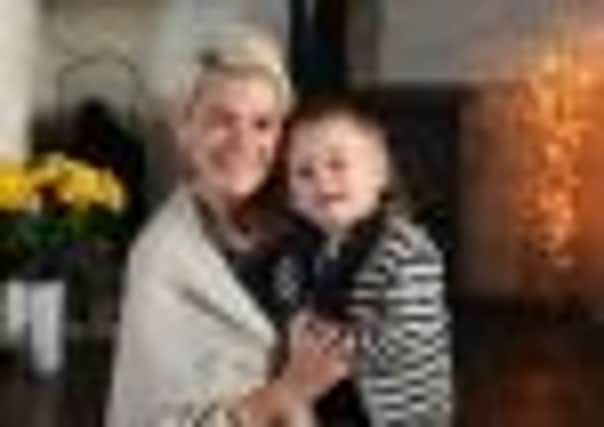Mum who faced chemo ordeal while pregnant


Steph Papworth was still getting used to finding out she was pregnant with her third child when she discovered a lump in her breast.
“I knew immediately it was cancer – I don’t know why I was 32, fit and healthy and with no family history of cancer , but I just knew,” says the 34-year-old from Bradford, who also has Jacob, 16, and Maisie, 11.
Advertisement
Hide AdAdvertisement
Hide Ad“I was just getting used to the idea of being pregnant again as it was a bit of a shock as I thought I had polycystic ovaries and didn’t realise I was pregnant until I went for a scan.


“I was also suffering morning sickness and was while being sick one morning that I felt the lump and automatically knew what it was.”
As well as dealing with the immediate fear of a diagnosis of breast cancer, Steph then had to decide when she should go ahead and have chemotherapy while pregnant.
“No-one at the hospital had ever treated a pregnant women with chemotherapy before.”
Advertisement
Hide AdAdvertisement
Hide AdSteph spent a lot of time researching the possible affects of the toxic chemotherapy on her unborn baby.
There have been concerns that giving chemotherapy to pregnant women could have an effect in the development of their child.
However a study this year found that giving chemotherapy to women after the first trimester (12 weeks) did not affect the baby.
But Steph had a stark choice.
“My cancer was aggressive and had already spread to my lymph glands. If I didn’t have any treatment then there was a high chance I would leave my baby and my two other children without a mum and that was something I couldn’t do. The hospital said they were happy to treat the cancer as cancer and the pregnancy as a pregnancy.”
Advertisement
Hide AdAdvertisement
Hide AdSteph, who is a drug and alcohol counsellor took the difficult decision to go head with the chemotherapy.
Her pregnancy was closely monitored and she admits that she was concerned about the effect the four bouts of chemotherapy she had might have on her unborn son.
“I couldn’t let myself think about the pregnancy too much or the end result. I just had to take every day as it came. No-one knew how my body was going to cope with the chemo and being pregnant.”
Despite feeling exhausted by her treatment, Steph was determined to try to keep life as normal as possible for her two children.
Advertisement
Hide AdAdvertisement
Hide Ad“It was scary enough for them to know mum’s got cancer, so I made sure that I took them to school and tried to keep everything normal.”
Although Gabriel arrived six weeks early weighing 4lbs 13oz Steph was assured it had nothing to do with the chemo.
“Because he was premature and his lungs weren’t fully developed they did more tests than normal so I know that the chemo hasn’t affected him. I was so relieved when I realised that he was fine.”
But shortly after Gabriel was born Steph had to continue with her chemo and start radiotherapy.
Advertisement
Hide AdAdvertisement
Hide AdShe was given the one year all-clear in July and is looking forward to celebrating Gabriel’s second birthday next month. “My family and friends have been amazing and so have the children. We have learnt to laugh through some dark times.”
Now Steph, who is studying for a degree in psychology is backing Breast Cancer Awareness Month.
“We are still prudish when it comes to checking ourselves. Everyone should know there own breasts and examine themselves regularly, even men. I talk to Jacob’s friends about it. There is nothing to be embarrassed about, it could save your life.”
A study published earlier this year found that babies whose mothers undergo cancer drug treatment during their pregnancy do not appear to suffer any long-term harm.
Advertisement
Hide AdAdvertisement
Hide AdIt is known that giving chemotherapy in the first 12 weeks, when the baby’s organs are still forming, raises the chances of birth defects.
Postponing the treatment, however, could allow the cancer to spread. Over the last decade, doctors have been more willing to use chemotherapy after the first trimester, but there have been worries that the child’s brain and heart could suffer damage.
Researchers in the Lancet Oncology journal report that they have followed the progress of 70 children whose mothers had chemotherapy while they were in the womb.
The study began in 2005, recruiting some children retrospectively and following others from birth. Every few years the children, who ranged in age from 18 months to 18 years, were given physical and mental development tests.
Advertisement
Hide AdAdvertisement
Hide AdThe children’s thinking and reasoning capacity was similar to that of other children – but those born prematurely, often because it had been thought advisable to deliver the baby early to begin the mother’s cancer treatment, had lower development scores than those who were born around term (40 weeks’ gestation).
Allowing for variables such as age, sex and country of birth, the child’s IQ was 12 points higher for every extra month he or she spent in the womb.
As women have babies at a later age, the numbers of those diagnosed with cancer while pregnant is rising, the authors say.
Their work suggests cancer treatment should not be delayed if a pregnant woman needs it and that it may be more damaging to the child in the long term to wait and then deliver the baby prematurely.
“We show that children who were prenatally exposed to chemotherapy do as well as other children,” conclude the authors.